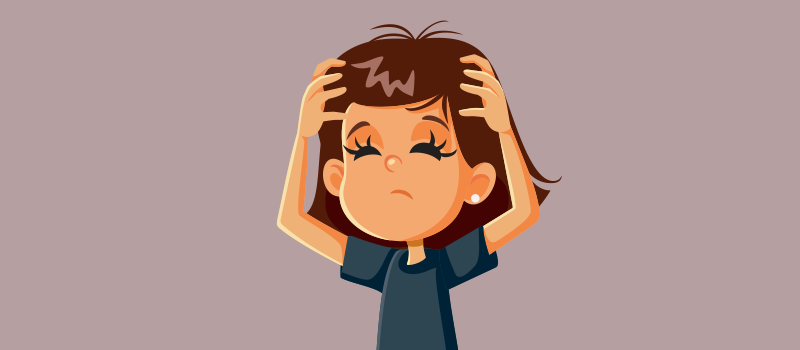What’s the Buzz
The Bee Healthy Blog
Dry Scalp vs. Dandruff: Similarities, Differences & Treatment

If you have an itchy scalp or see white flakes scattered across your shoulders, you probably think it’s dandruff. But it could also be dry scalp. These are two different conditions with some overlapping symptoms. Please continue reading to learn about the similarities and differences between dandruff vs. dry scalp and how to treat them.
Is dandruff the same as dry scalp?
Dandruff and dry scalp are not the same. Dandruff occurs due to an overproduction of skin cells and fungal overgrowth.
All animals and humans shed skin cells. This is called dander, and it’s natural. Normally, these skin cells fall off and are invisible. However, sometimes, the sebaceous glands in the skin become overactive and produce excess oil. This causes dead skin cells to clump together on the scalp. As a result, they form larger white flakes on the skin’s surface called dandruff.
The other cause of dandruff is an overgrowth of a fungus called Malassezia globosa. This fungus is usually controlled by the immune system. Dandruff can develop in people with low immunity, low vitamin D3 levels, inflammatory conditions, aggravating hair care products, allergies, or mental stress. In this case, it is a mild form of skin inflammation (seborrheic dermatitis). The inflammation leads to the formation of large white dandruff flakes, which fall off the scalp and settle along the hair shafts. When you brush or tousle your hair, the flakes fall onto your shoulders. Dandruff does not indicate a dirty scalp or poor personal hygiene. It can happen to anyone.
So, what is dry scalp?
The main cause of dry scalp is the skin not producing enough sebum (natural oils) to keep the scalp moisturized. As a result, the top layer of skin dries out, cracks, and ultimately sheds. The dry skin cells fall off as fine flakes, which can resemble dandruff. Dry scalp occurs due to various reasons, such as the use of harsh hair care products, frequent shampooing, sun exposure, dry climate, hormonal changes, side effects of medications, and genetics.
Does dandruff come from dry scalp?
Dandruff does not come from dry scalp. It is a skin condition that occurs due to excess oil and the overgrowth of a fungus. Therefore, the main difference between the two is that dry scalp is simply a lack of hydration, whereas dandruff is a medical condition. It is worth noting that you can have both dry scalp and dandruff together.
How can I tell if I have dandruff vs. dry scalp?
Both dandruff and dry scalp can make your scalp itch and lead to the formation of flakes. However, dandruff flakes tend to be larger, yellowish, and oily, while those caused by dry scalp are smaller and whiter.
What does dry scalp and dandruff feel like?
A dry scalp can feel itchy, tight, and uncomfortable like the skin is stretched across your head. It can also be associated with dull and frizzy hair.
Dandruff can cause an itchy and irritated scalp with noticeable flakes on the scalp and eyebrows, oiliness, and sometimes, redness.
How to treat dandruff and dry scalp?
Treatments for Mild Dandruff
Over-the-counter anti-dandruff shampoos and conditioners can help to relieve irritation, calm an itchy scalp, control flaking, and reduces redness. Examples include Head & Shoulders, DermaZinc, Neutrogena T/Gel, Baker P&S, Selsun Blue, and others. They contain ingredients such as zinc pyrithione, coal tar, salicylic acid, and selenium sulfide.
Prescription Dandruff Shampoos
Most people benefit from over-the-counter treatments for dandruff. However, if these products do not control itching, flaking, and irritation, your healthcare provider may give you prescription-strength shampoos or medications, such as:
- Nizoral anti-dandruff shampoo, which contains an antifungal medicine ketoconazole
- Capex and Derma-Smoothe/FS, which contain a topical corticosteroid, fluocinolone, and can be used for two weeks to calm scalp irritation and inflammation
- Calcineurin inhibitors, such as pimecrolimus (Elidel) and tacrolimus (Protopic), to suppress the immune system in severe cases
Treatment for Dry Scalp
- Try a pre-shampooing routine to nourish and add moisture to your scalp, for example, with a hair oil.
- Use a gentle shampoo and moisturizing conditioner to control dryness - look for ingredients like aloe vera and oat milk, and avoid alcohol-based shampoos, which can be harsh.
- Avoid shampooing too frequently.
- Use lukewarm water and not scalding hot water to wash your head.
- Consider using a humidifier in your home if you live in a dry climate.
How to prevent dandruff and dry scalp?
Here are some tips for the prevention of dry scalp and dandruff:
- Take an omega-3 supplement to regulate oil production and reduce flaking and fungal growth.
- Take vitamin D supplements to help slow the growth of skin cells
- Review your hair care routine and choose moisture-rich, anti-inflammatory, antimicrobial shampoos, conditioners, and masks that contain ingredients like tea tree oil.
- Try to control stress which is a known trigger for dandruff.
Do I need to see a doctor for dandruff or dry scalp?
You should see a primary care provider or dermatologist for proper diagnosis and treatment if your dry scalp or dandruff does not improve after several weeks of trying home remedies and over-the-counter anti-dandruff products. These conditions can make you miserable with incessant itching and irritation if left untreated. They can also lead to complications like scalp infections.
Wrapping up
Dry scalp and dandruff are two different conditions that are often mistaken for one another. They are both easily treatable, but knowing the difference between dry scalp vs. dandruff is important to help you choose the proper treatment.
References:

SOCIAL